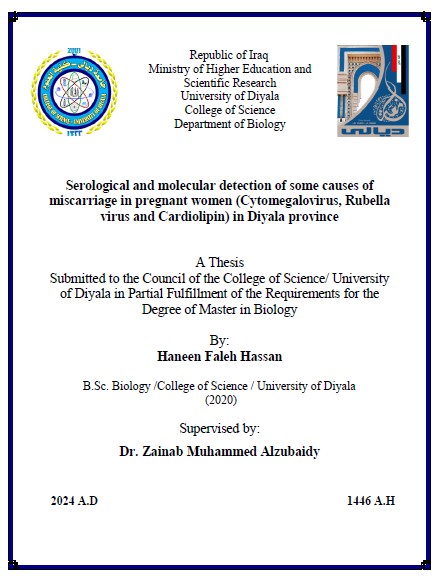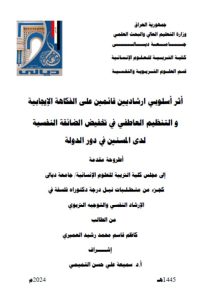المستخلص
Viral infections such as cytomegalovirus (CMV) and rubella virus (RV) infections, as well as autoimmune antibodies such as anticardiolipin (ACL), may have negative impacts on both the maternal and fetal health during pregnancy, leading to repeated pregnancy loss.
The current study was aimed at exploring the role of CMV, RV, and ACL autoantibodies in spontaneous abortion among pregnant and non-pregnant women and also to figure out their relation with certain sociodemographic and risk factors.
This study was conducted in Diyala province for the period from October 2023 to May 2024. Three study groups were included; 40 pregnant women with previous abortion, 40 non-pregnant women with previous abortion, and 40 apparently healthy pregnant women. The mean age ± SD of these groups were 28.0 ± 6.1, 30.7 ± 6. 7and 28.6 ± 6.0 years respectively. Women privacy was respected by taking participants verbal consent. Blood samples were collected, and sera were separated and submitted for the detection of anti-CMV IgG, IgM, anti-Rubella IgG, IgM as well as ACL Abs using ELISA techniques. Furthermore, a number of anti-CMV IgM and anti-RV IgM positive samples were further submitted for PCR techniques. Statistical analysis was performed using IBM SPSS version 29. A (p≤ 0.05) indicated statistical significance.
The results showed that all (100%) of pregnant women and non-pregnant women were positive for the anti-CMV IgG versus 38(95%) of the control women without significant differences. On the other hand, 19(47.5%) of pregnant women and 16(40%) of non-pregnant women were positive for anti-CMV IgM which were significantly higher compared to controls 3(7.5%), (P= 0.0001). Furthermore, 32(80%) of pregnant women, 30(75%) of non-pregnant women and 33(82.5%) of controls were positive for RV IgG Abs, additionally, only 1(2.5%) of non-pregnant women was positive for RV IgM Abs without significant difference. For the anti-CL IgM, 1(2.5%) of pregnant women, 2(5%) of non-pregnant women and 1(2.5%) of controls were positive without significant difference. The results also found that the highest anti-CMV IgM positivity rate (61.5%) among pregnant women was among those 25-29 years old. The highest rate (42.9%) of RV IgG Ab negative among pregnant women and control women was ≥ 35 years, and among non-pregnant women was among 30-34 years. Additionally, women who were positive for anti-CL IgM in the three groups were among those with 25-35 years old.
Molecular results established that 9(75%) out of 12 anti-CMV IgM positive samples were positive for IE2 (UL122) gene by RT-PCR; 6 were belong to pregnant women, and 3 were belong to non-pregnant women. Regarding the IE1 (UL123), 9 (100%) were positive for that gene. The RV PCR result found that only 1 (20%) was positive which was also positive for anti-RV IgM.
It can be concluded that CMV, RV and ACL autoantibodies respectively were still bearing fetal/maternal risks. ELISA techniques are efficient for detection of these agents. Mandatory early screening of all pregnant women for these markers are recommended to minimize the adverse effects of these conditions.




